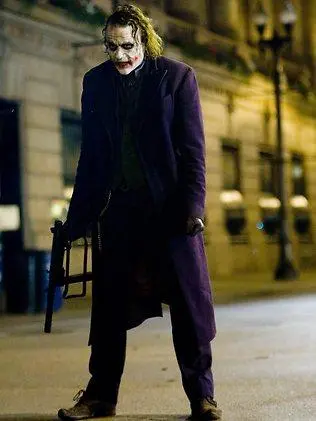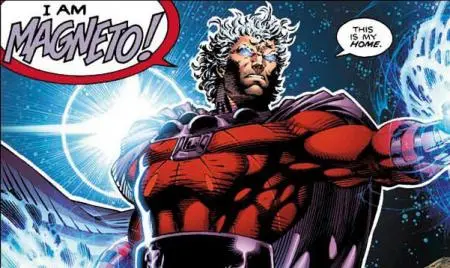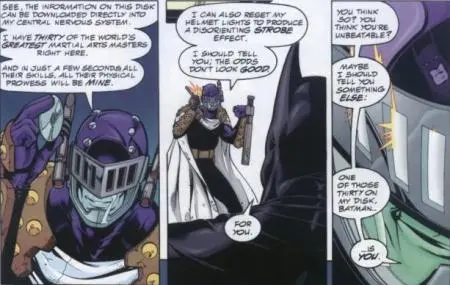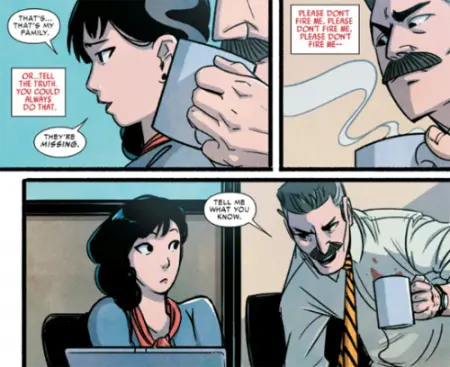I’m going to spell out the problem here, right up top, so we can spend most of this column talking about the solutions.
Comic books and comic book movies are filled with an ever-growing roster of great heroes. What hasn’t grown proportionally is the number and quality of the villains.
Don’t believe me?
If we look at some of the recent-ish comic movies, they have a lot of utterly forgettable villains who amount to “some asshole.”
Guardians of the Galaxy: Some asshole wants to blow up a whole planet because of a treaty and something something.
Thor: The Dark World: Some asshole wants to make the Earth all red and dusty because where he’s from it’s all red and dusty and it sucks.
Batman V. Superman: Some asshole wants Batman to fight Superman because...no wait, he wants to make a Doomsday out of a corpse and his blood because...because.
Doctor Strange: Some asshole wants to come and destroy the Earth because it’s just sort of his jam.
Suicide Squad: Some asshole wants to end the human race because she’s mad at some people for imprisoning her or something.
What all of these villains have in common is they’re just “some asshole.” They don’t have a lot of personality, they don’t have a lot of logic or emotion to them. They just aren’t interesting to watch.
I have to admit, in most of these movies, I got swept up in something else. The effects, what the good guys were doing, a cape that was like the magic carpet from Aladdin, Kat Dennings. Something came up and I wasn’t paying a whole lot of attention to the villains. It wasn’t until later, on the way home, that I thought, “Wait. What?”
Some folks will tell you it’s a story problem. Not like a Wayside School story problem where they try to trick you into math, a problem with the way the story is written.
But I say nay. I say the problem isn’t the story, it’s the villains.
Let’s talk about what good comic book villains are and why they’re needed.
A Good Villain Is Not 2-Dimensional
I have two ways to test the 3-dimensionality of comic book villains.
The first one is about the emotional dimension, and it’s in the form of a question: Is there some part of me that understands the villain, as a person?
If the answer is yes, then there’s potential in the villain.
Mr. Freeze is a good example of this, when he’s done well. Mr. Freeze doesn’t particularly want to fight Batman. He doesn’t want to amass wealth. He wants to cure his wife. This means he often ends up doing some bad shit in order to amass the needed resources, but it’s all in service of his goal. That makes sense. It's just a more exciting version of stealing bread to feed your family.
Here’s the other test, more about the visuals: The Silhouette Test.
Really distinct comic book characters are recognizable in silhouette.
Let’s look at the villain from some of the movies. Travolta from Punisher in silhouette. And that dude from Ghost Rider. And Bullseye from the Daredevil movie.
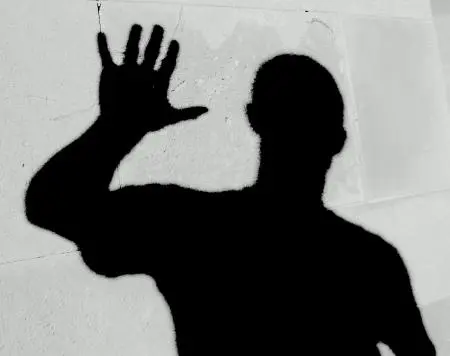
Pretty much just some asshole.
The movies want to be gritty and real, and they forego wilder costumes for reality. But that doesn’t mean your character has to be so bland as to be mistaken for a weather pattern (lookin' at you, Galactus).
The silhouette can include posture too. A well-done Spider-Man almost never stands around. He’s crouched somewhere, on the wall, on the ceiling.
Let’s look at Heath Ledger’s Joker.
![]()
image
Look at the posture. His chin was often tucked into his chest. His head was almost always tilted to one side or the other. Just the way he carried his body made him different.
Like I said, lots of good characters break the rules. But if your character doesn’t pass either of these two tests, your movie might be in 3D, but your character probably isn’t.
We Love A Villain With Charisma
Loki.
If you traveled back in time to 2010, before Marvel’s Thor, and if you asked them who the Avengers should fight in their first movie, you’d have heard Ultron, maybe Thanos. Kang? Doctor Doom?
After Thor came out, the choice of Loki was a slam dunk.
Tom Hiddleston’s performance took a fairly middling villain (Ah! Opinions!) and made him into a true adversary, despite the fact that a lot of the things I don’t like about Marvel villains are true about Loki as well. His plans aren’t super clear, his reasons aren’t super clear. He’s just so damn watchable! He’s smug, he’s sure of himself, and he’s the smartest person in the room. He personifies these villainous terms that nobody uses in real life, stuff like “diabolical” and “dastardly.”
Sometimes I think filmmakers are afraid that a charismatic villain will steal the show. It almost feels like there’s someone saying, “No, this movie is called Captain America, not The Red Skull: Red And Loving It. Not The Red Skull: Red Head Redemption. Not anything with the Red Skull, so don’t make him all that interesting, please.”
The Red Skull: Skullvengeance. Okay, that’s enough.
Go ahead and make the villain more charismatic than the hero. If it turns out that you did so in error, eh, you’ve got a Dark Knight on your hands. Worse things have happened. Just, y’know, try not to wipe out your villain until the end of the movie. When the Joker leaves Dark Knight, that’s when I start folding laundry. Sorry, Two-Face.
A Good Villain Wants Something
No, blowing up the universe doesn’t count.
No, turning our dimension into some crappy, windswept, red-tinged dimension doesn’t count.
No, destroying Gotham via the water supply because...you feel like folks there are too big for their britches, that’s not really a thing.
A good villain wants an outcome. Something beyond the horizon of today’s goal.
The important thing here is the sequence. A good villain wants something, and that’s what makes them a villain. Not the other way around. A person wants something, does some bad stuff to get it, and becomes a villain. That’s a story. Having someone who does bad stuff because they’re bad, that’s not so much a tale as old as time.
The Villain Needs To Be Threatening To The Hero In Some Way
This can take a few forms. One is obvious, the physical threat.
This is why it works when Captain America and Iron Man fight each other. You honestly can’t say which character will win. They are both legitimate physical threats, and they’re on a similar level.
There’s also the other kind of threat, the threat of power. Which we might find in someone like Lex Luthor. Luthor obviously can’t defeat Superman in a fistfight, but he can create a situation in which Superman may be forced to cross a line he doesn’t want to cross. Luthor is smarter than Superman, and he’s actively using his intelligence to hurt Superman in any way he can.
The best villains are probably a bit of both physical and emotional threat. The worst villains are only one of these two things, set to the extreme.
In Batman V. Superman, we had a Lex Luthor that was not physically threatening in the slightest. He just wasn’t imposing at all. Not even to me, and I'm threatened by trees that make scary shadows at night.
Likewise, was it all that exciting to watch Superman fight the physically-equal but mindless Doomsday? Was it satisfying in any way?
Both villains were ends of the spectrum. Lex was not physically threatening in the least, Doomsday posed no threat beyond the physical. Two villains defeated, and the outcome just wasn't satisfying.
Good Villains Make Good Use Of Talent
Christopher Eccleston. Mads Mikkelsen. Lee Pace.
Why would you bother hiring Mads to be in your movie only to make him a lifeless zombie? It seems like such a waste of a genuine talent.
If you're making a movie and wondering whether it was a good investment to pay a good actor to do almost nothing, alarm bells should be going off. If an actor is going to waste and is the main villain in a movie, you can almost bet that villain isn’t all that interesting.
A Good Villain Isn’t Just Opposite A Hero
A good comic book villain doesn’t just exist to be the opposite of a hero. A good villain seems to be someone who would exist regardless of the hero’s existence.
Let’s look at Magneto and Professor X. The two are not opposites. It’s not like Magneto has super strong legs or something. It’s not like Professor X manipulates all plastic objects. It's not like Magneto has awesome hair and Professor X is bald.
Wait. Just kidding on that last one.
Magneto and Professor X aren't simple opposites. They want the same thing. They want an end to the struggle between mutants and humans. The difference is one seeks peace while the other seeks dominance.
In reality, they’re more the same than they are different. They just go about it in very different ways, which puts them at odds.
It’s what turns a hero/villain conflict into something more meaningful than a constant, “Nuh-uh,” “Yes-huh!”
A Good Villain Narratively Exposes The Hero’s Weakness
The perfect example of this is the Superior Spider-Man series.
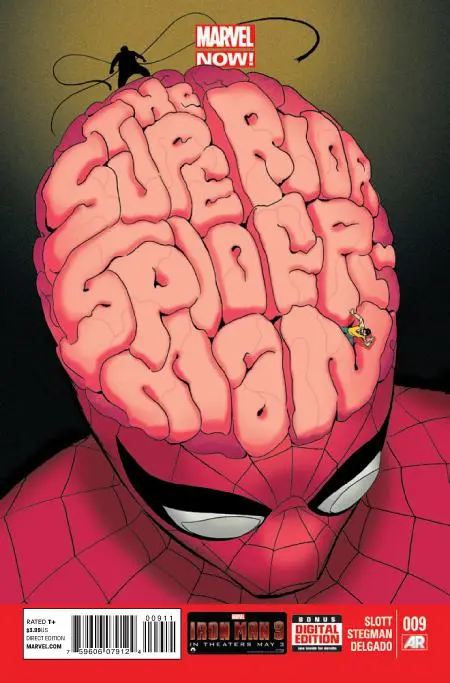
The basics: Spider-Man and Dr. Octopus do a body swap. Let’s not worry about how that all works for the moment.
When Dr. Octopus takes over Peter Parker’s body, you’d expect him to just wreck everything. But he doesn’t. Instead, he wants to live life as Peter Parker. And as Spider-Man.
In the early stages of the transformation, Dr. Octopus proves himself to be the titular Superior Spider-Man. He shows that Peter Parker’s been relying on his superpowers, punching his way out of bad situations, when he should have spent a little more time thinking through his crimefighting, using his mind to create better solutions. He shows how ridiculous it is for Parker to carry on romances that inevitably end in tragedy. He makes Peter Parker, who's supposed to be very smart, look like a moron.
The story is less about a body swap, more about highlighting and eliminating Peter Parker’s weaknesses as Spider-Man, one by one.
A Good Villain Attacks A Character’s Strengths
In The Fighter’s Mind by Sam Sheridan, Sheridan exposes wisdom from some of the world’s best fighters. One of the pieces of wisdom I’ll never forget is the idea of attacking a fighter not by exploiting their weakness, but by defeating them in their area of strength. The idea being, if you can defeat an opponent in whatever realm they think they shine, their confidence will be blown. To be defeated by a great puncher isn’t as big a deal if you’ve never been a strong puncher yourself, but to be defeated by a grappler when grappling is your thing, that’s a whole different story.
Bad villains come at the hero’s weakness. For example, Mr. Mxyzptlk uses magic, which Superman can’t defeat. And so, every time we get the same story. There’s a sequence of Mr. Mxyzptlk breaking stuff and Superman fixing it, then Superman tricks the guy into saying his own name backwards and he disappears.
Is that really more exciting than this:
![]()
JLA #16
My Favorite Good Villain Done Right
If I had to go back in recent-ish history and pick one comic movie villain, it’s an easy pick.
J. Jonah Jameson as played by J.K. Simmons.
Probably more antagonist than villain, Jameson shows us that being a good opponent for a superhero isn’t about having cool powers or a rad costume.
Sure, there’s been many a contrived reason for Jameson to hate Spider-Man over the years. Most of it nonsense. But as early as Amazing Spider-Man issue #10, we got this:
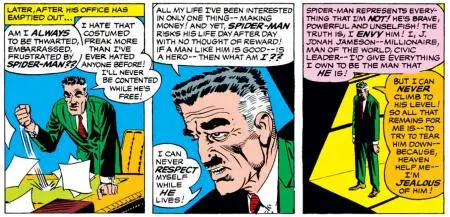
This is an overly simplified version of what’s going on, definitely not screen-ready. But isn’t this a lot more interesting than, “I’m going to blow up the Earth”? Doesn’t it make a lot of sense? And doesn’t it do a good job of showing the different paths taken by people in power? You can try to live up to greatness, or you can try to bring it down so that the bar is lowered for everyone.
And because it gives Jameson places to go, he remains an interesting character. He can change.
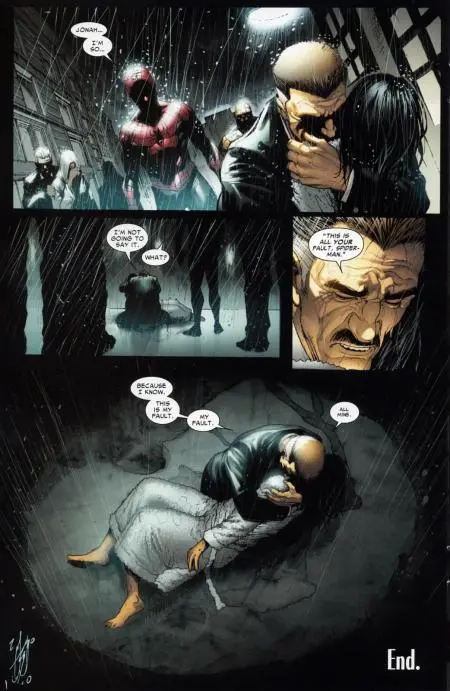
ASM #654
He’s a rare villain who’s genuinely funny. The comic relief of his ridiculousness combined with his being a prick is a great and rare combo.
And through newer titles like Silk, we can see Jameson as not just Spider-Man’s enemy. He’s also a journalist. And sometimes he’s even a good boss.
![]()
image
More than anything, his dastardly, diabolical plans are in line with his skills, abilities, and scope. He's not trying to blow up the world. He's just occasionally creating some weird super robot to beat the crap out of a Spider-Man.
This, people, is a good villain. There’s room for him to change. He’s charismatic as hell. He wants something (money). He’s threatening to the hero, at least in secret identity form. He exposes the hero’s weakness (the hero’s inability to be a top-tier, non-menace hero and/or doing what’s best for him versus doing what’s right). And it's super satisfying when Spider-Man takes him down a peg.
J. Jonah Jameson. The World's Greatest Supervillain. You heard it here.

About the author
Peter Derk lives, writes, and works in Colorado. Buy him a drink and he'll talk books all day. Buy him two and he'll be happy to tell you about the horrors of being responsible for a public restroom.
